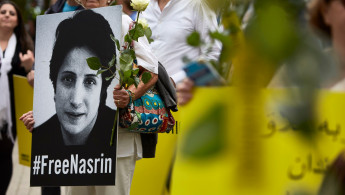Iranian lawyer putting 'life on line' in prison hunger strike
A prize-winning Iranian lawyer is over three weeks into a hunger strike to draw attention to the plight of political prisoners in the country during the Covid-19 pandemic, as international concern grows over the state of her health.
Nasrin Sotoudeh, co-laureate of the European Parliament's prestigious Sakharov prize in 2012, is serving a 12-year sentence in Tehran's Evin prison, imposed last year, after she defended women arrested for protesting compulsory headscarf laws.
Her husband Reza Khandan said on social media channels that she began the hunger strike on August 11, posting a statement from Sotoudeh saying that the conditions of political prisoners detained on "unbelievable" charges were impossible to tolerate and they were offered no legal hope of release as the pandemic engulfs Iran.
Sotoudeh, 57, said her strike was to secure the release of political prisoners - who have not benefited from the furloughs that saw tens of thousands of other convicts freed during the pandemic - after the judiciary ignored her written pleas.
"She has found no means other than a hunger strike and putting her life on the line to advocate for the release of people who should not be in prison in the first place," said Hadi Ghaemi, executive director for the Center for Human Rights in Iran (CHRI), based in New York.
"With the Covid outbreak in the prisons, she is directing attention to the plight of the hundreds of political prisoners like her who are like sitting ducks, and the government and judiciary are completely ignoring their situation," he told AFP.
|
'Unprecedented repression'
Ghaemi said Iran was experiencing a period of "unprecedented repression" with hundreds arrested in the last months on political charges.
The country has been shaken by the effects of sanctions, along with November 2019 protests over fuel price hikes, which were followed by what activists describe as one of the biggest crackdowns since the shah was deposed in 1979.
Amnesty International said in a report this week that it had registered testimony from 500 people, arrested after the protests, who were subjected to unfair legal proceedings.
It alleged that there had been an "epidemic" of torture in prisons, including waterboarding and sexual assault.
In another report, the Abdorrahman Boroumand Center for Human Rights in Iran, based in Washington, said the extent of the Covid-19 outbreak was far greater in Iranian prisons than the authorities admit, accusing prisons of failing to observe basic hygiene measures.
"Prisoners discuss with wardmates, the guards, they talk to prison officials. Then nothing works and they write to the judiciary, they write to officials and nothing works again so they have to go on hunger strike," said its executive director Roya Boroumand.
"This is the only means they have," she told AFP.
'Direst of consequences'
Concern is growing for Sotoudeh's health as the monthlong mark for the hunger strike approaches.
According to her husband, she is weak and has refused injections offered by the prison authorities.
"We are heartbroken to see Nasrin's health deteriorate day by day while imprisoned on unjust charges," said Karin Deutsch Karlekar, director of the Free Expression at Risk Programs at PEN America, which awarded her its 2011 Freedom to Write prize.
"She is now facing the direst of consequences for her activism and expression," she said.
On Tuesday, the German Judges Association (DRB) awarded its Human Rights Prize to Sotoudeh, calling her a "symbol of the Iranian civil rights movement" and saying it wanted to raise public awareness of her fate.
The risks for Sotoudeh were made all too apparent last month when Ebru Timtik, a lawyer in Turkey detained on terror charges she vehemently denied, died after 238 days of hunger strike.
Activists say the Iranian authorities have also been directly targeting Sotoudeh's family with a string of measures aimed at making her give in, including freezing her family's bank accounts over the summer.
And in August, her 20-year old daughter Mehraveh Khandan was arrested on charges of assaulting a prison guard while visiting her mother. She was released on bail but still risks being put on trial.
"They (the authorities) are trying to set a precedent and send a message to others that they are not afraid of going beyond individuals and will collectively punish them," Ghaemi said.





 Follow the Middle East's top stories in English at The New Arab on Google News
Follow the Middle East's top stories in English at The New Arab on Google News


![22 Arab countries at COP29 have rejected the targeting of fossil fuels [Getty]](/sites/default/files/styles/image_330x185/public/2024-11/GettyImages-2184289638.jpg?h=199d8c1f&itok=ptHl5bec)